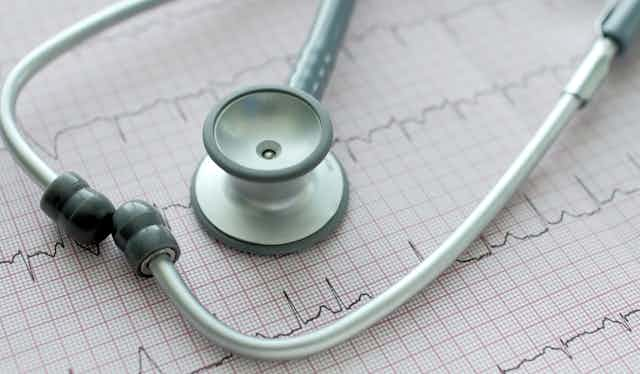On its 70th anniversary, there is good news from the NHS. About 7,000 strokes have been prevented, per year, thanks to GPs getting better at identifying people with a common form of heart arrhythmia known as atrial fibrillation and thanks to more of these people being prescribed anticoagulant drugs.
Atrial fibrillation is a heart condition where the heart beats irregularly and often very fast. It happens when electrical impulses in the heart fire in a disorganised way, causing the atria (the top chambers of the heart) to flutter.
Although the exact cause of atrial fibrillation is not known, several risk factors have been identified, including increased age, male sex, high blood pressure, heart valve disease, diabetes and thyroid disease.
There are about 1.7m people in the UK with atrial fibrillation, according to Public Health England.
People with the condition are four times more likely to suffer from a stroke, and the strokes they suffer are more likely to leave them disabled or result in death.
Doctors have known for two decades that two thirds of these strokes could be prevented with anticoagulants – drugs that prevent blood clotting. As a result, anticoagulants are recommended for almost everyone with the condition, apart from a small number who are young and do not have any other risk factors.
Earlier research from our team identified room for improvement in preventing stroke. We showed that patients with intermittent atrial fibrillation were less likely to be treated, even though they are just as likely to benefit. We also showed that one in ten patients have a record showing that their atrial fibrillation has resolved, nevertheless they continue to be at high risk of stroke. Despite this, few people in this group are prescribed anticoagulants.
Once a patient has been labelled by their GP as “AF resolved”, they are no longer on the atrial fibrillation register and so they are no longer followed up by their doctor. But this problem could be resolved with a simple change to the rules for incentive payments, encouraging GPs to keep these patients on the register.

Quiet revolution
To prevent strokes, two things have to happen: patients with atrial fibrillation need to have their condition diagnosed, and they need to be treated. For our latest study, published in the journal Heart, we wanted to know how good the NHS is at identifying and treating atrial fibrillation.
To answer this, we identified how many patients were diagnosed with atrial fibrillation in each year, from 2000 to 2016, and how many of these known patients were on treatment.
For men and women, in all age groups, the number of people diagnosed with atrial fibrillation increased year on year. In 2000, the number of people diagnosed with atrial fibrillation was about 800,000. By 2016, this figure had increased to 1.2m – a 50% increase.
Detection and diagnosis have clearly improved. But shouldn’t we have identified all of the estimated 1.7m people with atrial fibrillation? It turns out that this estimate is just that – an estimate. The NHS might be close to identifying everybody with the condition. At worst, it has identified three quarters of those with the condition.
What about treatment? Here again, it’s good news. In 2000, only 35% of patients with atrial fibrillation received anticoagulants; by 2016, the figure had more than doubled to 76%. Alongside this, fewer people are being treated unnecessarily. Young people with atrial fibrillation who have no other risk factors don’t need to take the medication. Among this group, one in five were being treated in 2000, but by 2016 that figure had fallen to one in ten.
Over 16 years there has been a quiet revolution in stroke prevention in UK general practice, a revolution that may be preventing 7,000 strokes a year. There is scope for improvement, but in its 70th year, the NHS is in robust health.

